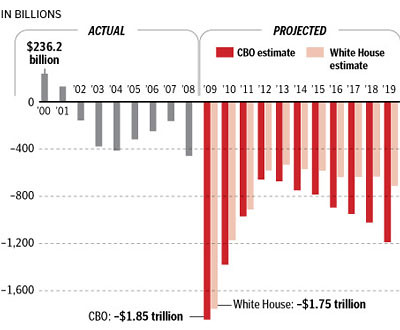Good questions. The graphs are suspect because they don't contain a source. Starting with taxes, even CBO scores are suspect because they have to do static analysis. Don't get me wrong- I like the CBO, I think they do honest work, and I believe they're professional and nonpartisan. However, they have to operate under certain constraints and they're like a computer- garbage in, garbage out. When they analyze the revenue effects of tax cuts, they're not allowed to consider the growth the private sector will experience as a result of the tax cuts. Such growth leads to more taxable dollars, albeit at a lower rate, and offsets some of the cost of the tax cuts. The problem is it's impossible to know how much is actually offset.
Also, there's probably about $400 billion credited to Bush that shouldn't be. The fiscal 2009 budget would belong to Bush, but Obama signed a $400 billion omnibus budget afterward he got elected. Because it was added to the 2009 budget, Bush probably got credited with it, but it should really be Obama.
As for the rest of the numbers on Obama's side, it's really hard to tell what's right and what's wrong because there really isn't a budget in the traditional sense. The Democrats in the Senate haven't even proposed a budget in over two years. Obama proposed a budget and it was so ridiculous that not one member of the Senate voted to approve it. I'm especially suspicious of the low cost of the health care entitlement. It's impossible to know how much it will cost because it's so huge, complex, and far-reaching that nobody knows how it's going to affect the economy. It seems to credit Obama the Iraq war draw down that Bush negotiated before leaving office. It also doesn't consider the increasing costs of our already existing entitlements as baby-boomers start retiring. Right now, spending is up to nearly 25% GDP when it's normally around 20%. As for entitlements, here's an oldy from 2009:

The situation has only gotten worse. According to the graphic, our deficit this year should be $900. Instead, it's $1.5 trillion.
But there are a few points to make here. For one, it's Congress who has the power of the purse. Yes, the President proposes a budget and traditionally, Congress uses that as a framework, but ultimately, it's Congress who has to deliver a budget for the President to sign. Too often, these Obama vs. Bush vs. Clinton vs. Bush I vs. Reagan spending arguments overlook that crucial fact- who was in charge of Congress. Second, the $trillion+ deficits would be forgivable if they were temporary. After all, TARP wasn't cheap (even though most of it got paid back) and the revenues lost are significant. It wouldn't bother me much if we could just get back to the days where a $500 billion deficit was considered huge, but that's not the case. It's huge deficits as far as the eye can see as we head into an entitlement crisis. Whatever damage Bush and the Republicans did during their reign, it makes no sense to hammer them for it and then step on the accelerator to make $1.5 trillion the new norm.
There are so many more points I can make, but I'll leave you with one last point- during the Bush years, the debt went from $5.9 trillion to $10.7 trillion, or an average increase of just over $600 billion a year. Now, it stands at $14.3 trillion, or an average increase of just over $1.4 trillion a year since January 2009. He, or someone else, needs to turn this around.




